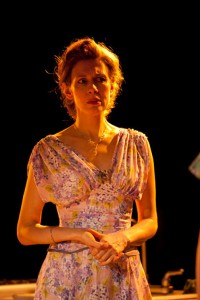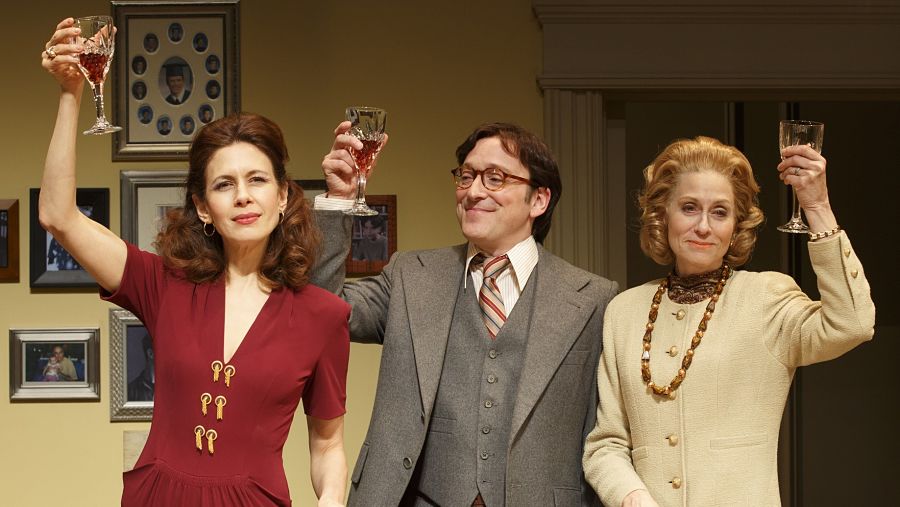“I’ve been doing so many revivals,” actress Jessica Hecht exclaims over tea. For her, the trick to the classics is clearing her head. “The whole struggle when you start working on a play is to hear it through whatever is going on in you, and then use that to make the story the strongest. Often people know the story of the play, so I don’t want to have some weird take on it just to have a weird take on it—but what are the plot points of this story that I can really tell from my character’s perspective?”
In A View from the Bridge, her Broadway gig from 2010, director Gregory Mosher and star Liev Schreiber were convinced that Hecht’s character Beatrice held Arthur Miller’s Carbone family together. “We kept working on this idea that this person was the strongest one in the room,” Hecht recalls. “Once you realize the context for which you’re telling the story, then it becomes a new story that no one’s read.”
Hecht learned a crucial lesson early on from fellow actor Dana Ivey, when Hecht made her 1997 Broadway debut in Alfred Uhry’s The Last Night of Ballyhoo. Ivey’s theory, Hecht recounts, is that a show’s success rests not on how the actors feel after the show but how long the show takes to perform—if you’re adding time, you’re indulging yourself. This utilitarian approach resonated with the younger actress. “You really have to train yourself. You’re not going to be able to repeat your emotional experience every night,” she reasons. “You have to learn what the story is, and how to convey that technically. Not that I don’t want to have an emotional experience—but if you’re doing a show eight times a week, how do you maintain it?
“I don’t believe the expression of the character’s desperation needs to be found through extreme physical challenges. I’m 47 years old,” Hecht adds lightheartedly, though she looks 10 years younger. “I’m more interested in the structure of this art form and making it work.”
While Hecht resists the isolating nature of Method acting, her personal process to get at the core of a character is deep and intricate. It was while attending her daughter Stella’s bat mitzvah that Hecht conceived of a new approach to playing the Nurse in Romeo and Juliet (a role she will take up for an upcoming reading with Elizabeth Olsen and Sam Rockwell at New York City’s Classic Stage Company).
“We had these Fellini films playing in the background during the party—there were all these images of Giulietta Masina, and she was so comforting and sprightly. I wanted the Nurse to be like this European character. In the context of Verona then, I had the idea that she would be a French version of Masina—so sensual. Also, French clowns are in a few of Shakespeare’s plays, and this Nurse is very funny.” As she describes the character, she slips into the language, channeling a French Masina, and the image of a more scantily clad Nurse than one has seen before comes to life.
Hecht also wanted to unbutton Olga in the Austin Pendleton production of Three Sisters at CSC in 2011. “Olga is the most romantic of characters. I’ve done her twice now, and I always think, ‘They see me as such an available bride, but I’m a hot ticket!’ Every time, they give you that freakin’ costume that’s so buttoned up, and your hair is so tight. Why would I be wearing that?” she wonders with a grin.
To the suggestion she do a production of Three Sisters wearing a slip, á là Elizabeth Marvel in Ivo van Hove’s Hedda Gabler, she replies, “I would love that.”
For now, the clothes will stay on as Hecht steps into the role of the Bascov family matriarch in Richard Greenberg’s eagerly awaited The Assembled Parties at Manhattan Theatre Club, slated to open April 17. In it, she plays a briefly famous actress who was “discovered by this Italian romantic director, like Franco Zeffirelli, when I was a teenager. Then I get married to the father in the play and we have this very cool New York life—or so it seems.”
The play is set during Christmas of 1980, then 20 years later. The ornate language provides another insight into the Bascov family. “Greenberg uses the idea that when people are not quite happy with where they are in life, but can’t acquire a thing, they acquire language. It’s such a brilliant idea.”
Hecht has delved into a plethora of desperate characters over the past couple of decades—she relished the experience of uncovering the layers of Tennessee Williams’s Stella for David Cromer’s production of A Streetcar Named Desire at Massachusetts’s Williamstown Theatre Festival in 2011, based on the 2010 production at Writers’ Theatre in Chicago—and she delights in the challenge of discovering what’s beyond their tragedies.

Sometimes, the actress says, the only way to grasp a character is through raw, guttural sounds that tap primal urges: “It’s very fine to go through a process in rehearsal where you say, ‘This is not the way it’s going to be performed, but I can’t figure out what she’s going through unless I sit here and cry for this woman.’ The line is sad, but she passes through it. Maybe it was 20 years ago, and I’m going to have an attitude about it, but I have to go through this to get to that other place.”
Even when she’s doing eight shows a week, Hecht has dinner with her kids—her son Carlo and her daughter (named after her mom’s favorite Barbara Stanwyck film, Stella Dallas)—and her husband, Adam Bernstein, a prolific TV director. “There’s something really old-school about our lives. I go home and make dinner around six, and we clean the house on Sunday.” Bernstein directed her in early episodes of “Breaking Bad” (TV news alert: her character Gretchen Schwartz, Walter White’s college lover, is probably going to come back for the final season), but she’s not in a rush to meld their working and home lives together. “Both of us, I think, have come to the point where it’s delicious if it happens, but it’s not part of our dynamic.
She adds, “I guess that, because I do a lot of plays in which people are going through an emotional time, there’s something very private and vulnerable about working together. I’d maybe feel…not that he’d be judging me, but that he would see something that didn’t ring true to him.”
It’s scrutiny of a different kind that led Hecht to auditioning for theatre after she landed a recurring role on “Friends” back in the 1990s, and this decision ultimately led to her Ballyhoo breakthrough and her subsequent stage career. “When I realized how there was this premium on your persona, keeping yourself together, and all this stuff that I felt inadequate at, my inclination was to come back to New York,” she says. At the time she felt like she “didn’t belong,” and believes this sense of alienation came through in her audition for Ballyhoo’s awkward Lala Levy. “It’s all funny how it worked,” she reminisces.
Hecht’s life and work clearly benefit from a disciplined sense of compartmentalizing, but she also projects the fervent belief that all the world is, in fact, a stage. “Do you think your character didn’t have dinner?” she proposes when asked about her working process. “Maybe if your character was in a concentration camp and was completely cut off from the world—but I haven’t played that character. I have played characters that are very dark, and still it’s the energy of going through your life that informs your choices. Why would staying alone in a closed room help you? Just look around you, where we live, feel the energy of being here.”
Arts journalist Christopher Kompanek writes frequently for this magazine.


